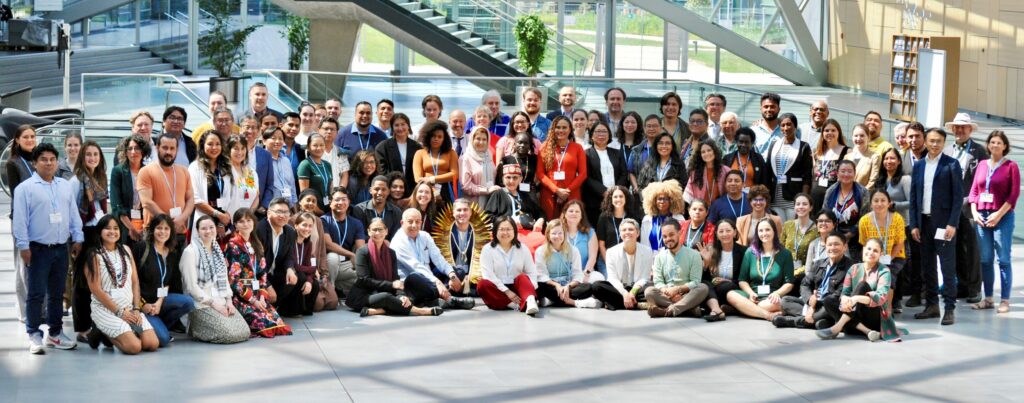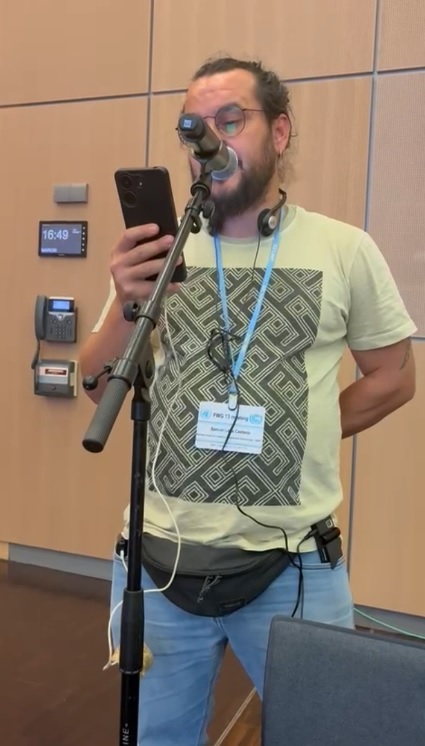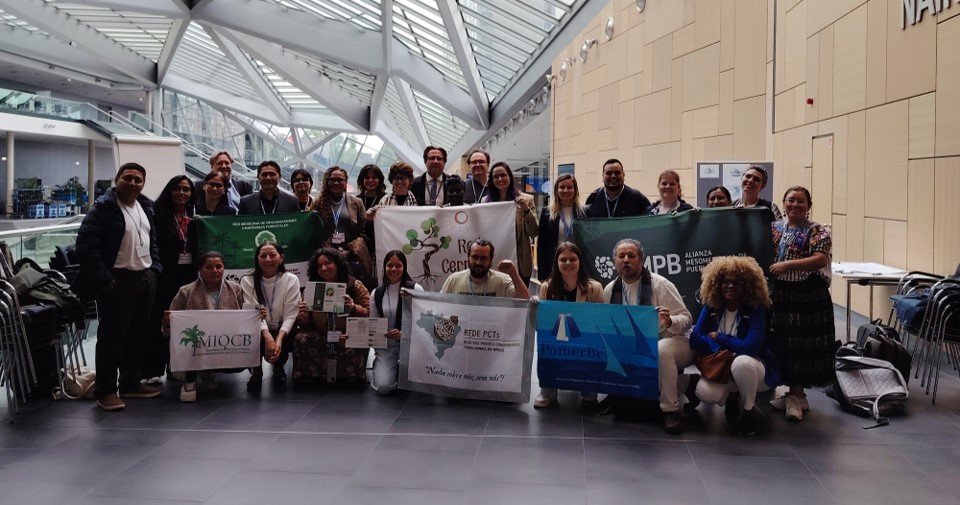We’re still here
For the first time, the traditional communities in Brazil to participate in the meeting of the group, the implementation of the Platform for the Local Communities and Indigenous Peoples, the Convention on the Weather. A discussion on the inclusion of gain range, and reveals the challenges that are dependent on the engagement of both Parties.
By Andreas Fanzeres / OPAN

The Conference on the Climate of Germany, the mission of which is to prepare decisions for the COP30, in Bethlehem, and he started telling the story to people and traditional communities in Brazil. Even without being recognized formally by the united nations Framework Convention United Nations convention on Climate Change (UNFCCC), the seven organizations which are representative of the communities that participated in the agenda opening of the meeting of the 13th Meeting of the Working Group, the Facilitator (FWG) of the Platform of Local Communities and Indigenous Peoples (LCIPP) to the UNFCCC, between the 10th and the 13th of the month of June. It was the first time in 2019, that this area has seen a qualifying participation of local communities in Brazil. They have made contributions, stressing the need for better conditions for their involvement in the climate agenda.

The presence of the mass of the brazilian at the same time, be open to the indigenous peoples, communities, observers, civil society, and governments, our aim was to show it to other people in the local community are involved, engaged, and interested in the buildings that seek to influence the climate change negotiations. “We are a collective of handling all the areas in a sustainable way, taking care of the water, the soil, the ecosystem. We are an active part of the diversity of social, cultural, and ecological, to our country. We have the histories, cultures, ancestralidades, and forms of governance, and the ways of life of their own, as recognized by our peers and is based on four essential criteria: collective identity, the link of the territory, develop their own forms of social organization and practices of sustainable use of nature,” as he spoke to Samuel he did, geraizeiro, and the president of the National Council of Traditional Peoples and Communities (CNPCT).
In 2018, the Conference on the Climate in Katowice, Poland (COP24), the nations agreed to the establishment of a mechanism for the operation of the LCIPP, which was set up in the Settlement of the city, such as a space which should be to strengthen the knowledge, technologies, practices and efforts of local communities and indigenous peoples to address and respond to climate change in a way that is holistic and integrated. It is in the Working Group, the Facilitator (FWG), which provides a great structure for the operation, with 7 members of the indigenous people and 7 of the representatives of the different countries. In Germany, there’s one more step to the rotation of the representatives, as it does every year. But this time, it was possible to listen to the members to go to our local communities, and to support their participation in addition to the formality of the space.
Carol Franco, vice-chairman of the board of the Subsidiary for the Advice of Science and technology (SBSTA), which is the Platform that is linked to, he pointed out that indigenous peoples and local communities, they are leaders and practitioners in climate action, and he encouraged her to work together in the FWG to operate the platform. Grace Balawag, on behalf of the International Forum of Indigenous Peoples on Climate Change (IIPFCC), has welcomed the commitment of the history of the indigenous peoples in the course of the years, until the ruling, which established a platform for the COP21, in Paris, france. “The Caucus has the lawyer is harder for the recognition of, and respect for the contributions of indigenous peoples in all of the tracks in the negotiation,” he said.
The innovations of the new plan of work
The plan of work of the Platform for a period 2025-2027, which was approved in the COP29 in the republic of Azerbaijan, has been bringing new innovations that are trying to overcome all the difficulties, the impact is not only for indigenous peoples and local communities, but also to the platform itself, as the body of the UNFCCC, which is still unknown by many and, therefore, has been given little consideration in the bargaining process.
For this reason, Ian Fry, the former un special rapporteur on the promotion and protection of human rights in the context of climate change, and the representative of the government of Tuvalu to the Convention, and suggested that the frequency of the decisions on the platform, the negotiations would be changed. “In the negotiations, in what we know about the Platform for the past three years. All the contributions made here have not reached in the negotiations. We are missing out on this wealth of knowledge. I would suggest to you that you request to the countries of the inclusion of an item in the calendar, so each year it is possible that the parties may know the work that is being done through the Platform,” he recommended.
In addition to the adoption of the terminology and expression of the universe of the indians, such as the approaches to the collective (collective approaches), which replaced all the activities and specific plans of the previous work, the main idea is that the results of the activities under each of the approaches which are to be listed and integrated along the tracks of the trade. In addition, as of right now, the FWG will set up a theme focused on all the approaches to the collective. This year, the subject was chosen by the members, brings together holistic management, a transition that is fair, hunger, and climate justice.
With regard to the methodology of the 13th meeting of the FWG, in response to a request vocalized for the first day of the meeting, Gustavo Sánchez, the president of the Mexican Network of Organizations, Forestry, and Rural areas (Red Mocaf), and other representatives of the local communities in Brazil, it was established for the first time, a forum for the local community to contribute with suggestions on how to improve and drive the implementation of the activities referred to in the Rig.
In addition to the contributions of spontaneous, when the participation of the observer was allowed to take place, the local communities, made a contribution on the activities referred to in the Plan of the Work, Did the inside of the approaches to class time in moderate to members of the FWG, Cozier Frederick, representing the countries of the Group of small Island States (SIDS), and Rafik Aini, by the Regional Group for Africa. They suggested, for example, issues such as the right to the lands of the local communities in the fight against climate change, and the importance of the management of the water in the soil, the synergies between the three Rio conventions (1992), which has experience in the management of community forests, and the adaptation of traditional food systems would guide you in the 5th meeting of the Holders of the Knowledge, which is predicted to take place at the COP30. And that this meeting would bring together indigenous peoples and local communities that are considering to work on a specific topic. For each of the six assumptions in the plan of the work, there have been suggestions that the country is never the Platform that he had seen him.

The group was formed by indigenous peoples, speakers of Portuguese, and Spanish, with the focus on water and food security was also highlighted, as well as the violence and the criminalization of indigenous leaders, and the need for the inclusion of discussions of the peoples in voluntary isolation in the context of climate change. The climate justice as a result of the justice of the territorial and was very stressed, which is in line with the priorities of the group of communities in the area. As a contribution to the shape of this type of dialogue in the upcoming CLOSURES, and the group claimed the benefits of the methodology of the Dialogue of the Talanoa, a word-for-word the Fiji islands, which inspired her to a format that is inclusive, participatory and transparent dialogue, adopted at COP23 that is based on story-telling, when a high-level representatives of the countries that have been able to listen to the civil society.
The head of the core of the Forest, to the COP30, the brazilian diplomat, Marco J, Cabral, took part in the work of the platform and announced on the first day of the Presidency of the COP30 will hold a workshop approved by the decision of the COP29 in Baku, it is separated into three phases. In the first Week of the Climate of Africa is scheduled to take place in September, and the second during the pre-COP in the world today, in the month of October, and the third in the COP30, in beth-lehem. He also talked about the Circle of People, formed on the Indigenous Committee of the International and the International Commission for the Traditional Communities of african Descent, and Farmers, an initiative which intends to expand the spaces of the representation of the civil society.
Tension
The presence of numerous organizations, civil society, traditional communities, and the government made the awkwardness, because it reminds you of a decision of the Parties of 2018 even today, has not been implemented, ensuring the place of the three members of the local community. This fact gave rise to the comments stating that the search for the involvement of local communities that could pose a threat to the rights of indigenous peoples. Consider, too, that the process of involvement of local communities and their contest for the recognition, it would be a fight worthy of Brazil, but no representation is global. This is because, in some contexts, the understanding of local communities, leaves room for the inclusion of social groups with operations and cut down on the territories of indigenous peoples.
In a speech, a touching, Angelica Mendez said the story of his grandfather, the Chico Mendes, and many others in the extractive industries, in partnership with the indigenous peoples, they have formed the Alliance of the Peoples of the Forest. “To see the local community coming out here and having a space to talk about is a very important time to connect to this alliance, which was created in the mid-80’s. As my colleagues have said, we’ve always been here,” he said. Marinalda Rodrigues, president of the Movement in Interstate commerce of the Quebradeiras de Coco Babaçu (MIQCB), then asked the playing field. “You can’t keep talking about on the inclusion of the local communities, the following are excluded from the process of climate negotiations,” he said.

“We are all different, but we’re not enemies or rivals. We are not here to compete with, or infringe the rights. What connects us is a struggle for redress for the rights and climate justice, since, historically, in our bodies, and the territories have been violated, and the truth, and for those of you that holds on to the financial resources,” he said Deroní Mendes, maroon, and the coordinator of the Programme, Transparency, Justice and the Climate of the Instituto Centro de Vida (ICV).
During the discussion with the trader in the European Union, to Geert Fremout, said that since the beginning of the process of the construction of the platform was in its early objectives. “I don’t think that it is time to take longer strides, and with a lot of discussion such as we have here, but at the same time, it is not mandated by the FWG to change its composition, which is expected to happen with the involvement of the country”, he directed. According to him, the efforts of the platform should be to strengthen the synergies, and the messages that are common between the indigenous peoples and local communities, and if they are the same influence on the outcome of the negotiations.
The spiritual leader, and I am an old woman, Mary Lyons has made the last of the intervention so excited. “Think about that for a quarter of a century, and we couldn’t not talk about it in this space. They gave us a little short of where you see people get into a fight. We need to get away. We are the adults to. When you start to fight with each other, guessing who is and who is winning?”
Applications
The organisations who represent the local community in attendance at the meeting of the FWG protocolaram the members of the board, the SBSTA and the Parties to the Convention, a letter requesting a formal recognition in the face of the UNFCCC. Among other things, they require the creation of a fund for the participation of the local communities, and the improvement of the intercultural dialogue and translation mechanisms for a better inclusion of the impact of the process.
Participated in the 13th Meeting of the Working Group, the Facilitator of the Platform of Local Communities and Indigenous Peoples in the Network of the Cerrado, the Movement is State of the Quebradeiras de Coco Babaçu, the Committee is of the Chico Mendes, the National Council for the Traditional Peoples and Communities, a Network of Traditional Peoples and Communities, the Association of PomerBR the people of the Pomerano, supported by organizations such as the Operation of the Amazon Original, the Institute is the Center of Life, and the Institute for Society, Population and Nature of the International Institute of Education of Brazil the Forum is a Popular social and Environmental-of-Mato Grosso (Mato Grosso) and the Institute for Climate and Society. With the Cooperation of the Amazon, and the Instituto de Pesquisa Ambiental da Amazônia, also were in attendance, as well as indigenous young people participating in the program Kuntari Katu.
The next meeting of the FWG is going to happen in Bethlehem from the 4th to the 7th of November, in the year 2025.
